- You are here:
- Home »
- Author's Archive:
All posts by Greg Reed
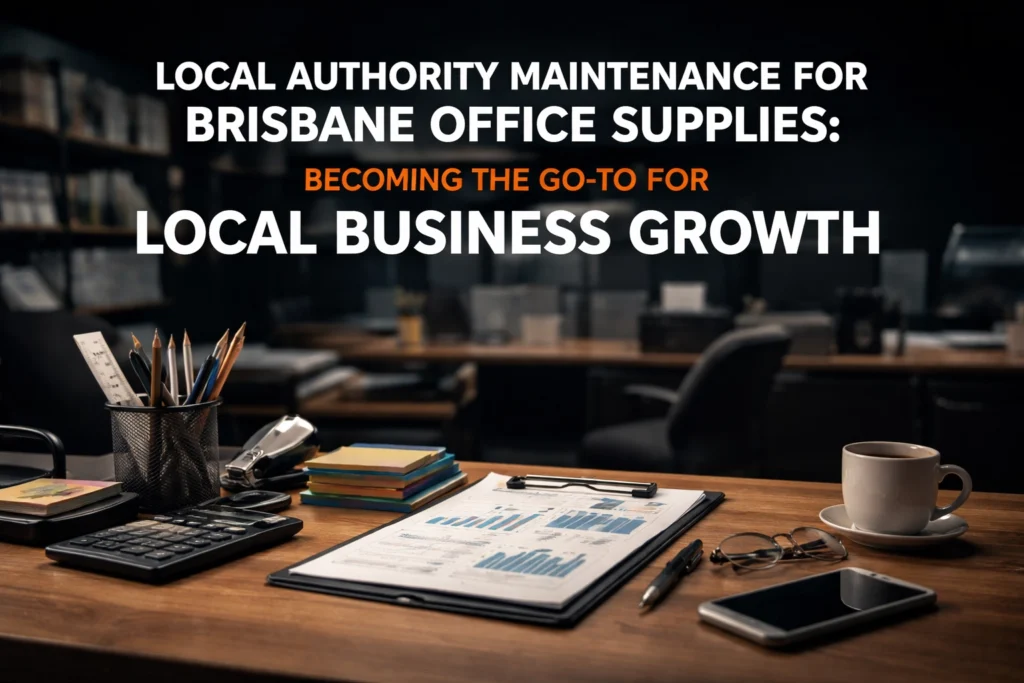
Local Authority Maintenance for Brisbane Office Supplies
Becoming the Go-To for Local Business Growth
Here’s a reality check: when a Brisbane business manager needs to restock printer paper, order ergonomic chairs, or source sustainable office products, they’re not scrolling through pages of Google results. They’re clicking on the first trusted supplier that shows up in their local search. Local Authority Maintenance for Brisbane office supplies businesses. Rank locally, win corporate accounts, and get found first by local firms.
The question is: are you that supplier?
For Brisbane office supplies businesses, building and maintaining local authority isn’t a luxury. It’s the difference between a steady stream of corporate accounts and watching competitors snap up contracts in your own backyard. From CBD high-rises to the bustling business parks of North Lakes, local businesses are actively searching for reliable suppliers who understand their needs.
Let’s break down exactly how you can position your office supplies business as the dominant local choice through strategic Local Authority Maintenance.
Why Local Authority Matters for Office Supplies Businesses
Think about your ideal customer for a moment. They’re likely:
- Office managers ordering bulk supplies for growing teams
- Startup founders setting up their first Brisbane workspace
- Procurement officers seeking reliable, fast-turnaround suppliers
- Facility managers maintaining multiple commercial spaces
These decision-makers value speed, reliability, and local expertise. They want a supplier who understands Brisbane’s business landscape: someone who can deliver next-day, offers competitive bulk pricing, and stocks products suited to Queensland’s climate and work culture.
Building local authority means you’re not just another online store. You become the trusted Brisbane partner they recommend to colleagues and return to quarter after quarter.
Monthly Website Tweaks: Keeping Your Digital Shopfront Fresh
Your website is your 24/7 salesperson. But here’s the thing: a stale website signals a stale business. Regular, strategic tweaks keep you relevant, visible, and conversion-ready.

Highlight What Matters Most
Every month, review your homepage and landing pages with these priorities:
- “Next-Day Brisbane Delivery” banners : This is your competitive edge. Make it impossible to miss. Position it above the fold on desktop and ensure it’s prominent on mobile. Brisbane businesses value speed, so lead with it.
- Update “New Arrivals” sections : Showcase the latest ergonomic furniture (standing desks, lumbar-support chairs) and eco-friendly tech (recycled paper products, energy-efficient devices). Fresh inventory signals an active, forward-thinking business.
- Optimise the “Bulk Order Quote” button : Corporate buyers want efficiency. Test your quote request process monthly. Is it fast? Is it mobile-friendly? Can a busy office manager request a quote in under 60 seconds? If not, streamline it.
Pro Tip: Seasonal Relevance
Align your website updates with Brisbane’s business calendar:
| Month | Focus |
|---|---|
| January | “New Year, New Office Setup” promotions |
| March/April | End of financial year bulk deals |
| July | EOFY restock campaigns |
| November | Christmas corporate gifting and stationery bundles |
These monthly tweaks aren’t just housekeeping: they’re conversion optimisation in action.
Suburb Profiling: Owning Brisbane’s Commercial Hubs
Generic local SEO won’t cut it. To dominate, you need to establish authority in the specific suburbs where your customers work. For Brisbane office supplies, that means targeting the city’s busiest commercial and business hubs.

Brisbane CBD
The heart of Queensland’s corporate scene. High-rise offices, law firms, financial institutions, and government departments cluster here. These businesses need:
- Premium stationery and presentation supplies
- Fast, reliable delivery (often same-day)
- Bulk consumables like printer cartridges and copy paper
Content angle: Position yourself as the supplier who understands the pace and professionalism CBD businesses demand.
Milton
A creative and commercial mix: advertising agencies, tech startups, and boutique consultancies call Milton home. They’re looking for:
- Modern, design-forward office accessories
- Ergonomic solutions for collaborative workspaces
- Sustainable and eco-friendly product options
Content angle: Speak to innovation and workplace wellness. Milton businesses care about brand image, and their office supplies reflect that.
Fortitude Valley
The Valley has evolved into a thriving business district alongside its entertainment roots. Expect a blend of creative agencies, co-working spaces, and hospitality head offices. Key needs include:
- Flexible, small-batch ordering for startups and freelancers
- Stylish desk accessories and organisational tools
- Tech peripherals and charging solutions
Content angle: Emphasise flexibility and supporting growing businesses at every stage.
North Lakes
One of Brisbane’s fastest-growing commercial corridors. Business parks, medical centres, and retail head offices are expanding rapidly here. These customers prioritise:
- Bulk ordering with competitive pricing
- Reliable delivery to outer-suburban locations
- Full-service accounts for ongoing supply needs
Content angle: Highlight your reach and commitment to servicing Brisbane’s growth areas: not just the inner city. Local Authority Maintenance for Brisbane office supplies businesses. Rank locally, win corporate accounts, and get found first by local firms will help.
Local SEO Articles: Building Topical Authority
Content isn’t just about traffic. It’s about demonstrating expertise and capturing search intent at every stage of the buyer journey. A strategic content calendar positions your business as the Brisbane authority on office supplies.
Here are three cornerstone articles every Brisbane office supplies business should publish:

1. Sustainable Office Solutions for Eco-Conscious Brisbane Businesses
Sustainability isn’t a trend: it’s a procurement priority. Brisbane businesses are increasingly required to meet environmental targets, and they’re actively searching for suppliers who can help.
Cover topics like:
- Recycled paper and eco-certified stationery
- Energy-efficient office equipment
- Reducing single-use plastics in the workplace
- Local suppliers with sustainable packaging
Target keywords: “sustainable office supplies Brisbane,” “eco-friendly stationery Brisbane”
2. The Ultimate Productivity Guide: Best Ergonomic Chairs for Brisbane Offices
With hybrid work models here to stay, businesses are investing in employee comfort. Ergonomic furniture is a high-value, high-intent product category.
Cover topics like:
- Key features to look for in ergonomic seating
- Top-rated chairs for different budgets
- How proper seating reduces workplace injury claims
- Local delivery and installation options
Target keywords: “ergonomic office chairs Brisbane,” “best office chairs for back support Brisbane” Use Local Authority Maintenance for Brisbane office supplies businesses. Rank locally, win corporate accounts, and get found first by local firms.
3. Equipping Your Growth: Must-Have Office Supplies for Brisbane Startups
Brisbane’s startup scene is thriving. New businesses need guidance on setting up efficient, professional workspaces without blowing their budget.
Cover topics like:
- Essential supplies checklist for new offices
- Budget-friendly bulk purchasing tips
- Scaling your supplies as your team grows
- Local suppliers who support small business
Target keywords: “office supplies for startups Brisbane,” “setting up an office Brisbane”
Pro Tip: Internal Linking Strategy
Each article should link to relevant product categories and your bulk quote page. This keeps readers on-site and guides them toward conversion.
Bringing It All Together: The Local Authority Advantage
Building local authority isn’t a one-time project. It’s an ongoing commitment to:
- Showing up consistently in local search results
- Demonstrating expertise through valuable content
- Staying relevant with regular website updates
- Owning your territory through suburb-specific targeting
For Brisbane office supplies businesses, this approach transforms your online presence from a passive catalogue into an active lead generation machine.
Your competitors are already investing in local SEO. The question is whether you’ll lead the pack or play catch-up.
Ready to Dominate Your Local Area?
At Content Charlie, we specialise in Local Authority Maintenance: the strategic, ongoing work that keeps your business visible, relevant, and trusted in your target market.
Whether you’re serving the Brisbane CBD, expanding into North Lakes, or capturing the creative crowd in Milton, we’ll help you build the local presence that drives real business growth.
Dominate your local area : Let’s make your office supplies business the first choice for Brisbane businesses.
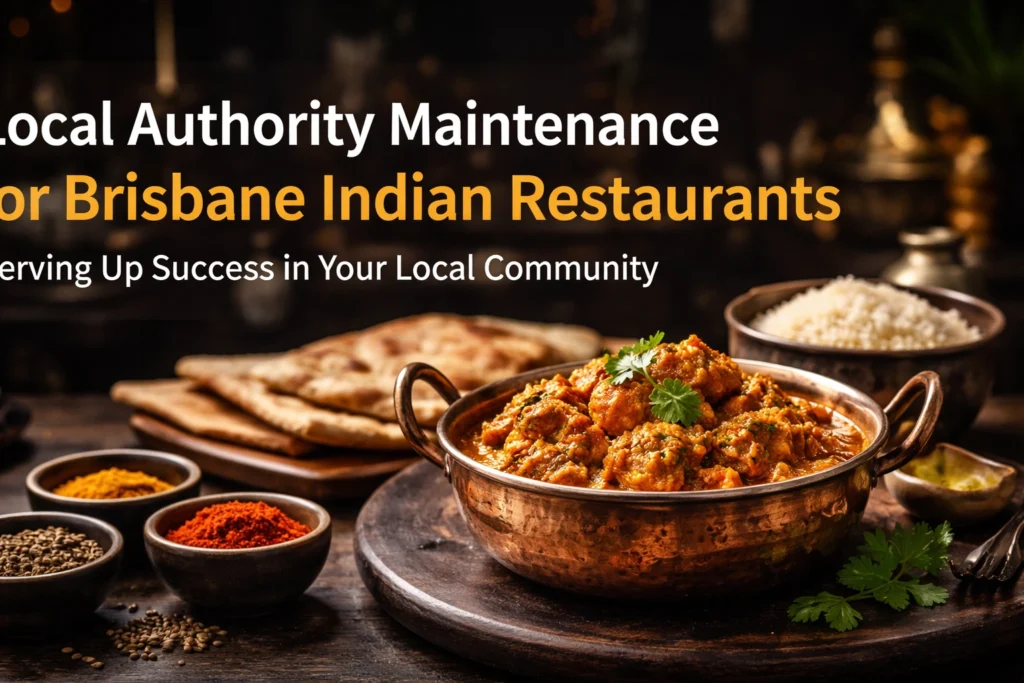
Local Authority Maintenance for Brisbane Indian Restaurants: Serving Up Success in Your Local Community
The aroma of freshly ground spices. The sizzle of a perfectly seasoned tandoor. The vibrant colours of a beautifully plated thali. Your Brisbane Indian restaurant delivers an unforgettable sensory experience, but is your online presence doing the same?
Here's the reality: 73% of diners research restaurants online before booking a table. If your digital footprint isn't as appetizing as your butter chicken, you're leaving hungry customers at your competitors' doors.
That's where Local Authority Maintenance comes in. It's not about a one-time website overhaul, it's about consistent, strategic updates that keep your restaurant front-of-mind (and top-of-search) in Brisbane's competitive dining scene.
What Exactly Is Local Authority Maintenance?
Think of Local Authority Maintenance as the ongoing care and feeding of your online presence. Just like you wouldn't serve yesterday's naan, you shouldn't let your digital presence go stale.
Local Authority Maintenance involves three key ingredients:
- Monthly website tweaks that keep your site fresh, functional, and conversion-focused
- Suburb profiling that establishes your restaurant as the go-to Indian dining destination in specific Brisbane neighbourhoods
- Local SEO articles that build your authority and capture hungry searchers
It's the difference between being "just another Indian restaurant in Brisbane" and being "THE Indian restaurant in West End" (or Fortitude Valley, or wherever your loyal customers live).
Monthly Website Tweaks: Keeping Your Digital Menu Fresh
Your website is your 24/7 host. It greets potential diners, showcases your offerings, and (ideally) converts browsers into bookings. But a neglected website is like a dusty menu, it doesn't inspire confidence.

High-Resolution Food Photography That Makes Mouths Water
Let's be honest, people eat with their eyes first. Those smartphone photos from 2019 aren't cutting it anymore.
Monthly maintenance means regularly refreshing your online menu with:
- Professional shots of signature dishes like your house-special biryani or that Instagram-worthy butter chicken
- Seasonal specials and new additions photographed to perfection
- Behind-the-scenes glimpses of your tandoor in action or fresh spices being prepared
Pro tip: Rotate your hero images monthly. Feature your lamb rogan josh in winter, your mango lassi in summer. It signals to visitors (and Google) that your site is actively maintained.
Mobile-First Ordering and Reservations
Here's a stat that should make you sit up: over 60% of restaurant searches happen on mobile devices. If your "Order Online" button requires a magnifying glass to find, you're haemorrhaging customers.
Monthly checks should ensure:
- Prominent "Order Online" buttons that are thumb-friendly and impossible to miss
- Streamlined "Table Reservation" functionality that works flawlessly on every device
- Click-to-call phone numbers for diners who prefer the personal touch
- Updated trading hours (especially important around public holidays and special events)
Customer Love: Your Secret Marketing Weapon
Nothing sells a vindaloo like social proof. Your happy customers are doing the marketing for you, you just need to showcase it.
Monthly review maintenance includes:
- Curating and displaying fresh Google and TripAdvisor reviews on your website
- Highlighting reviews that mention specific dishes, atmosphere, or service
- Responding to reviews (yes, even the occasional less-than-stellar one) to show you're engaged
- Creating a dedicated "Customer Love" section that builds trust instantly
Suburb Profiling: Becoming the Local Legend
Brisbane isn't one market, it's dozens of micro-markets, each with its own character, demographics, and dining habits. Smart Indian restaurants don't try to be everything to everyone. They dominate specific suburbs.

West End: The Cultural Melting Pot
West End's eclectic, multicultural vibe makes it prime territory for authentic Indian cuisine. The residents here value:
- Genuine authenticity over watered-down tourist versions
- Vegetarian and vegan options (West End has one of Brisbane's highest plant-based populations)
- Ethical sourcing and sustainability stories
- Vibrant, community-focused dining experiences
Your angle: Position your restaurant as the authentic, community-minded choice for West End locals who know real Indian food.
Fortitude Valley: Where Flavour Meets Nightlife
The Valley crowd wants bold flavours and late-night options. Think post-show dinners, group celebrations, and those "we need butter chicken at 10pm" moments.
Your angle: Emphasise your extended hours, group booking capabilities, and dishes that pair perfectly with a night out.
Chermside: Family-Friendly Northside Hub
Chermside families are looking for reliable, kid-friendly dining with plenty of parking and a welcoming atmosphere. They're repeat customers who value consistency.
Your angle: Highlight your family platters, mild options for little ones, and that comfortable, no-fuss dining experience.
Upper Mount Gravatt: The Southside Gem
Often overlooked, Upper Mount Gravatt has a growing foodie scene and less competition than inner-city suburbs. Early movers can establish serious dominance here.
Your angle: Be the neighbourhood's Indian dining destination before your competitors wake up to the opportunity.
Local SEO Articles: Feeding the Google Beast
Here's where the magic happens. Regular, locally-focused content tells Google exactly what you do and where you do it. More importantly, it captures diners at the exact moment they're searching for what you offer.
Article Ideas That Drive Hungry Traffic
"The Best Spots for Authentic Butter Chicken in Brisbane"
Yes, you'll mention competitors. But you'll also position YOUR butter chicken as a must-try, complete with what makes your recipe special. This article captures everyone searching for butter chicken in Brisbane: and puts you in the conversation.
"Why Local Sourcing is Changing the Brisbane Indian Dining Scene"
Diners increasingly care about where their food comes from. If you're sourcing local produce, free-range proteins, or supporting Queensland farmers, this story practically writes itself. It also differentiates you from chains and establishes you as a thoughtful, quality-focused establishment.
"A Foodie's Guide to the Most Vibrant Indian Flavours in Brisbane's Northside"
Geographic-specific content is SEO gold. This positions you as THE authority on Northside Indian dining: exactly what you want when someone in Chermside searches "Indian restaurant near me."

The Compound Effect of Consistent Content
One article won't transform your business. But 12 months of strategic, locally-focused content? That builds an authority moat your competitors can't easily cross.
Each article:
- Captures new search traffic from diners actively looking for Indian food
- Builds internal links that strengthen your overall site authority
- Provides social media content you can repurpose across platforms
- Establishes expertise that converts casual browsers into loyal regulars
Why Consistency Beats One-Time Efforts
Here's what we see time and again: restaurants invest in a beautiful new website, then let it gather digital dust for three years. By month six, the menu's outdated. By month twelve, the photos look dated. By month eighteen, competitors have overtaken them in local search.
Local Authority Maintenance flips this script.
| One-Time Website Project | Ongoing Local Authority Maintenance |
|---|---|
| Looks great… initially | Stays fresh and relevant year-round |
| Static content gets stale | Monthly updates signal activity to Google |
| Competitors catch up | You build an ever-widening authority gap |
| ROI diminishes over time | ROI compounds month after month |
The Bottom Line: Your Restaurant Deserves to Be Found
You've perfected your recipes. You've trained your team. You've created an atmosphere that transports diners straight to the streets of Delhi or the beaches of Goa.
Now it's time to make sure Brisbane knows about it.
Local Authority Maintenance isn't about gaming the system: it's about consistently showing up for your community, online and offline. It's about being the obvious choice when someone in West End, Fortitude Valley, Chermside, or Upper Mount Gravatt types "best Indian restaurant near me."
Your signature dishes deserve to be discovered. Your story deserves to be told. Your restaurant deserves to thrive.
Ready to Become Brisbane's Go-To Indian Dining Destination?
Stop leaving hungry customers on the table. With strategic, ongoing Local Authority Maintenance, your restaurant can dominate local search, build unshakeable community authority, and keep those tables full night after night.

Local Authority Maintenance for Brisbane Private Schools: Strengthening Your Reputation and Community Presence
In Brisbane's competitive private education landscape, reputation is everything. Families investing in premium education expect excellence at every touchpoint: from the moment they first discover your school online to the day their child graduates.
But here's the challenge: maintaining that prestigious digital presence requires consistent, strategic effort. Your website isn't a "set and forget" asset. It's a living reflection of your institution's values, achievements, and community standing.
That's where Local Authority Maintenance comes in: a systematic approach to keeping your school's online presence polished, relevant, and positioned as the definitive choice for discerning Brisbane families.
Why Local Authority Matters for Private Schools
Consider this: 93% of parents research schools online before making any enquiries. Your digital presence often forms the first impression: long before families step foot on your immaculate grounds.
Local authority isn't just about ranking on Google (though that certainly helps). It's about:
- Establishing your school as the educational leader in your suburb and surrounding areas
- Building trust through consistent, high-quality content that reflects your standards
- Showcasing your unique position within Brisbane's prestigious education community
- Converting website visitors into enrolled families
Private schools face unique digital challenges. You're not selling a product: you're inviting families into a community, a tradition, and a future. Your online presence must communicate that depth and distinction.

Monthly Website Tweaks: Keeping Your Digital Campus Immaculate
Just as your grounds team maintains pristine lawns and gleaming heritage buildings, your website requires regular attention to detail. Here's what effective monthly maintenance looks like for Brisbane private schools:
Virtual Tour Optimisation
Your virtual tour is often a family's first "visit" to your campus. Monthly checks should ensure:
- All links function flawlessly across desktop and mobile devices
- Load times remain fast: prospective parents won't wait for buffering
- New facilities or renovations are promptly featured
- Seasonal imagery reflects the current campus atmosphere
Pro tip: Test your virtual tour on multiple devices each month. A broken link or slow-loading panorama can cost you a prospective enrolment.
Enrolment Deadline Countdowns
Creating urgency while maintaining prestige is an art. Effective countdown management includes:
- Updating key dates for tours, open days, and application deadlines
- Adjusting messaging as deadlines approach (from "Register your interest" to "Final places available")
- Removing expired content promptly to maintain credibility
- Coordinating with your admissions team on waitlist communications
Campus Life Galleries
Nothing sells your school better than authentic moments of student achievement and community. Monthly gallery maintenance involves:
- Adding high-quality photos from recent events, sporting achievements, and academic celebrations
- Rotating featured images to keep the homepage fresh
- Ensuring proper permissions and captioning for all imagery
- Archiving dated content while maintaining a comprehensive history
Your galleries should tell the story of a vibrant, active community: not a static institution frozen in time.

Suburb Profiling: Cementing Your Local Legacy
Brisbane's private schools don't exist in isolation. They're woven into the fabric of their communities: and your digital presence should reflect those deep roots.
St Lucia: Academic Excellence Meets Riverside Prestige
Schools positioned in St Lucia benefit from proximity to the University of Queensland and the suburb's established reputation for academic achievement. Your content should emphasise:
- The academic pipeline from primary through to tertiary education
- Community partnerships with university programs and research initiatives
- The suburb's family-friendly environment and dedication to educational excellence
Toowong: Heritage and Accessibility
Toowong offers the perfect blend of heritage character and modern accessibility. Highlight:
- Transport connectivity for families across greater Brisbane
- The suburb's educational history and your school's role within it
- Community events and local partnerships that demonstrate your engagement
Clayfield: Prestige and Tradition
Clayfield's tree-lined streets and stately homes attract families who value tradition and refinement. Position your school by featuring:
- Historical milestones and distinguished alumni
- Architectural heritage alongside modern facilities
- The suburb's reputation as a premier family destination
Brookfield: Space, Nature, and Holistic Development
For schools in Brookfield, the emphasis shifts to:
- Expansive grounds and outdoor learning opportunities
- Environmental programs and sustainability initiatives
- The benefits of semi-rural education within reach of Brisbane's CBD
Pro tip: Create dedicated landing pages for each suburb you serve. This not only improves local SEO but demonstrates your understanding of different community needs.

Local SEO Articles: Positioning Your School as the Authority
Strategic content creation establishes your school as the go-to resource for families navigating Brisbane's private education landscape. Here are three cornerstone articles every Brisbane private school should publish:
"Navigating the Private School Enrolment Process in Brisbane"
This comprehensive guide should cover:
- Timeline expectations: when to begin researching, touring, and applying
- Documentation requirements and how to prepare
- Scholarship and bursary information
- What admissions teams are really looking for
- Common mistakes to avoid
Position your school as helpful and transparent, building trust before families even enquire.
"The Importance of Co-Curricular Excellence in Brisbane's Elite Schools"
Co-curricular programs often differentiate schools at the highest level. Address:
- The research supporting well-rounded education
- How co-curricular involvement develops leadership and resilience
- Specific programs your school offers (without being overtly promotional)
- Success stories from students who've benefited from diverse opportunities
"Why Location Matters: Choosing a School That Complements Your Brisbane Lifestyle"
Help families understand how geography impacts their educational decision:
- Commute considerations and their effect on family life
- Community integration and weekend activities
- Property values and long-term family planning
- The unique character of different Brisbane educational precincts

The Compound Effect of Consistent Maintenance
Here's what many schools miss: local authority isn't built overnight. It's the compound result of consistent, strategic effort over months and years.
Each monthly tweak, each suburb-focused update, each valuable article adds another layer to your digital reputation. Over time, you become:
- The first search result when families research schools in your area
- The trusted resource parents share with friends considering private education
- The obvious choice for families who value excellence and community
Schools that neglect their digital presence don't just fall behind: they actively cede ground to competitors who understand the game.
| Maintenance Activity | Frequency | Impact |
|---|---|---|
| Virtual tour checks | Monthly | Trust & engagement |
| Gallery updates | Monthly | Social proof |
| Deadline countdowns | As needed | Conversion |
| Suburb content | Quarterly | Local SEO |
| Authority articles | Monthly | Thought leadership |
Your Next Step: Dominate Your Local Area
Brisbane's private education sector is more competitive than ever. Families have choices: and they're making decisions based on what they find online long before they attend your open day.
Local Authority Maintenance ensures your digital presence reflects the same excellence you deliver on campus. It's systematic, strategic, and designed specifically for institutions that refuse to be second-best.
Your school has spent decades building its reputation. Isn't it time your online presence matched that legacy?
Dominate your local area and ensure Brisbane families find you first: and choose you with confidence.

Local Authority Maintenance for Brisbane Vet Clinics: Building Trust and Care in Your Community
When a pet owner searches "vet clinic near me" at 10pm because their dog just ate something suspicious, they're not browsing, they're desperate. And in that moment, the clinic that shows up first, looks trustworthy, and makes booking easy wins their business for life.
For Brisbane vet clinics, local authority isn't just a marketing buzzword. It's the difference between being the go-to practice in your suburb and getting lost in a sea of competitors. The good news? Building that authority doesn't require a massive budget or a full-time marketing team. It requires consistency, strategy, and a genuine connection to your local community.
Let's break down exactly how your clinic can become the trusted name in pet care across Brisbane's most pet-loving neighbourhoods.
Why Local Authority Matters for Veterinary Clinics
Pet owners are fiercely loyal, but only once you've earned their trust. Before that first appointment, they're doing their homework:
- Reading reviews from other local pet parents
- Checking your website to see if you look professional and caring
- Searching for answers to their pet health questions
- Looking at your team to see who'll be handling their fur baby
If your online presence doesn't reassure them at every touchpoint, they'll move on to the next option. Local authority maintenance ensures your clinic consistently shows up, looks trustworthy, and provides value to your community, month after month.
Monthly Website Tweaks: Small Changes, Big Impact
Your website is your digital waiting room. It should feel as welcoming and professional as your actual clinic. Here's what to focus on each month:

Keep Your 'Meet the Team' Page Current
Pet owners want to know who will be caring for their animals. A static, outdated team page with formal headshots and generic bios doesn't cut it anymore.
Monthly actions:
- Update bios to include personal touches, favourite breeds, pets at home, special interests
- Add new team members promptly (nothing says "outdated" like a missing staff member)
- Rotate in fresh, candid photos showing genuine interactions with patients
- Highlight any new certifications, training, or specialisations
Pro tip: Include a fun fact for each team member. "Dr. Sarah has three rescue cats and can't resist a good ear scratch" makes your team instantly more relatable.
Make Emergency Contact and Booking Buttons Unmissable on Mobile
Over 60% of local searches happen on mobile devices. When someone's panicking about their pet, they need to find your phone number or booking button within seconds.
Check these monthly:
- Is the "Call Now" button visible without scrolling on mobile?
- Does your "Book Online" button stand out with a contrasting colour?
- Are your after-hours emergency instructions crystal clear?
- Does everything work properly? (Test it yourself!)
Refresh Your Patient Gallery with Local Pets
Nothing builds trust like seeing happy, healthy pets from your own community. A regularly updated patient gallery shows you're active, caring, and connected.
Monthly gallery goals:
- Add 3-5 new patient photos (with owner permission, of course)
- Include a mix of dogs, cats, and other pets you treat
- Feature pets from different suburbs you serve
- Add brief captions: "Luna from Ascot after her dental clean, what a smile!"
Suburb Profiling: Becoming the Local Expert
Brisbane is a city of distinct neighbourhoods, each with its own character. Smart vet clinics don't try to serve "all of Brisbane", they establish deep roots in specific suburbs where their ideal clients live.

Target Pet-Loving Premium Suburbs
For Brisbane vet clinics, these suburbs represent prime territory:
| Suburb | Why It Matters |
|---|---|
| Ascot | Affluent families, high pet ownership, willing to invest in premium care |
| Hendra | Growing young professional population, dog-friendly parks nearby |
| Coorparoo | Established families, mix of houses with yards perfect for pets |
| Indooroopilly | Large residential area, strong community feel, multiple dog parks |
How to Build Authority in Each Suburb
Create suburb-specific content:
- Write about local dog parks and walking spots
- Mention nearby pet-friendly cafes and businesses
- Reference local events like community markets
Get involved locally:
- Sponsor local sports teams or school events
- Partner with suburb-based pet businesses (groomers, pet stores, trainers)
- Attend community events with a friendly, informative presence
Optimise for local search:
- Include suburb names naturally in your website content
- Create dedicated landing pages for key suburbs
- Ensure your Google Business Profile lists all suburbs you service
Pro tip: When a pet owner in Ascot searches "vet near Ascot Brisbane," you want your clinic appearing with content that specifically mentions their neighbourhood. It immediately signals "we're local, we understand your area."
Local SEO Articles: Providing Value Year-Round
Here's where the magic happens. By publishing helpful, locally-relevant content, you position your clinic as the knowledgeable, caring authority Brisbane pet owners turn to for advice.

Article Idea #1: Managing Tick Season in Brisbane: A Guide for Local Pet Owners
Brisbane's subtropical climate means paralysis ticks are a year-round concern, peaking in spring and early summer. This is exactly the kind of topic local pet owners are actively searching for.
Content to cover:
- When tick season peaks in Brisbane specifically
- Which Brisbane suburbs and bushland areas pose higher risks
- Symptoms every local pet owner should watch for
- Prevention methods suited to Brisbane's climate
- What to do if you find a tick (and when to call your clinic immediately)
Article Idea #2: Preparing Your Pets for a Brisbane Summer: Heat Safety Tips
Brisbane summers are brutal, and pet owners genuinely worry about keeping their animals safe. This article provides immediate value while showcasing your expertise.
Content to cover:
- Safe exercise times during Brisbane's hottest months
- Signs of heatstroke specific to different breeds
- Cooling strategies that work in subtropical humidity
- Which Brisbane beaches and parks are safest for summer outings
- Emergency steps if overheating occurs
Article Idea #3: The Best Dog-Friendly Walking Tracks in Brisbane's Western Suburbs
This one's clever, it's not directly about vet services, but it serves your target audience perfectly. Pet owners searching for walking tracks are exactly the engaged, active pet parents you want as clients.
Content to cover:
- Detailed guides to tracks near Indooroopilly, Kenmore, Chapel Hill
- Difficulty levels and which breeds suit each track
- Seasonal considerations (flooding, heat, ticks)
- Nearby water stations and off-leash areas
- Link naturally to your tick prevention or summer safety content

Putting It All Together: Your Monthly Maintenance Checklist
Consistency is everything. Here's a simple checklist to keep your local authority growing month after month:
Website updates:
- Review and refresh team bios
- Test mobile booking and emergency buttons
- Add new patient photos to gallery
- Check all contact information is current
Local SEO:
- Publish one locally-focused article
- Update Google Business Profile with any changes
- Respond to all new reviews (yes, even the tricky ones)
- Check suburb-specific pages are performing
Community connection:
- Engage with local pet groups on social media
- Identify one local partnership or sponsorship opportunity
- Share community pet content (with permission)
The Clinics That Show Up, Win
Brisbane pet owners have plenty of options when choosing a vet clinic. But they don't want just any vet: they want their vet. The one who knows the local parks, understands Brisbane's unique climate challenges, and feels like part of their community.
Local authority maintenance isn't about flashy marketing or aggressive advertising. It's about showing up consistently, providing genuine value, and building trust one interaction at a time.
Your clinic already provides exceptional care. Now it's time to make sure every pet owner in your area knows it.
Ready to become the go-to vet clinic in your Brisbane suburb?
Dominate your local area

Local Authority Maintenance for Brisbane Buyers Agents
Securing Your Edge in a Competitive Market
Brisbane’s property market moves fast. Auctions heat up, off-market deals vanish overnight, and buyers are doing their homework before they ever pick up the phone. So here’s the question every buyers agent needs to ask: when potential clients search for expert help in their suburb, do they find you: or your competition? Local Authority Maintenance for Brisbane buyers agents to rank in suburb searches, build trust, and attract high-intent property buyerswill improve your chances.
Local authority isn’t something you build once and forget. It’s an ongoing process of positioning yourself as the go-to expert in specific Brisbane pockets. The agents who consistently maintain their local presence are the ones capturing the best leads and closing deals while others wonder where the enquiries went.
This is where Local Authority Maintenance comes in. Let’s break down exactly how Brisbane buyers agents can secure their edge in this competitive market.
Why Local Authority Matters More Than Ever for Buyers Agents
Consider this: a first-home buyer in Paddington isn’t just searching “Brisbane buyers agent.” They’re typing “buyers agent Paddington” or “help buying house Bardon.” They want someone who knows their streets, understands the local auction culture, and can spot a lemon before they waste their Saturday morning.
Your online presence needs to reflect that expertise: constantly. Here’s what consistent local authority maintenance delivers:
- Higher visibility in suburb-specific searches
- Increased trust from prospects who see regular, relevant content
- More qualified leads from people ready to act in your target areas
- Competitive differentiation from generalist agents who spread themselves thin
The buyers agents winning right now aren’t necessarily the biggest. They’re the most locally visible and consistently active.
Monthly Website Tweaks: Keeping Your Digital Shopfront Sharp
Your website is your 24/7 salesperson. But if it’s showing the same content from six months ago, it’s sending the wrong message. Regular, strategic updates signal to both Google and potential clients that you’re active, successful, and in-demand. Local Authority Maintenance for Brisbane Buyers Agents will help.

Highlight Recent Property Acquisitions
Nothing builds credibility like proof of results. Each month, showcase your recent wins:
- High-quality images of properties you’ve secured for clients
- Brief case studies explaining the challenge (competitive auction, off-market find, tricky negotiation) and how you delivered
- Suburb tags to reinforce your local expertise
Pro tip: Don’t just post the pretty Queenslander in Clayfield. Show range: the investment unit in Upper Mount Gravatt, the family home in Bardon, the first apartment in Paddington. Prospects want to see you handle deals like theirs.
Optimise Your ‘Submit Your Property Brief’ Forms
Your lead capture forms are where interest becomes opportunity. Monthly tweaks can dramatically improve conversion:
- Simplify fields: ask only what you need to qualify and follow up
- Add suburb dropdown menus to immediately segment leads by area
- Include a budget range selector to pre-qualify enquiries
- Test different CTAs: “Get Your Free Property Strategy Session” often outperforms “Submit”
Small changes compound over time. A 10% improvement in form conversions across a year? That’s significant pipeline growth. Local Authority Maintenance for Brisbane Buyers Agents gives you the edge.
Update Client Success Stories
Testimonials and case studies are trust accelerators. But they need variety and freshness:
| Client Type | Story Focus | Suburb Example |
|---|---|---|
| First-home buyer | Navigating competition, securing under budget | Paddington |
| Investor | Identifying high-yield opportunities | Upper Mount Gravatt |
| Upsizer family | Finding the right fit in a tight market | Bardon |
| Downsizer | Stress-free sale-and-buy coordination | Clayfield |
Rotate these stories monthly. Feature different demographics, price points, and suburbs to show breadth while reinforcing local depth.
Suburb Profiling: Establishing Authority Where It Counts
Generic “Brisbane buyers agent” positioning is a race to the bottom. The smart play? Own specific suburbs in the minds of your market.

For Brisbane buyers agents, high-demand and investment-grade suburbs offer the best return on your authority-building efforts. Consider focusing on:
Paddington
- Tightly held, character-home market with fierce auction competition
- Attracts professionals, young families, and lifestyle buyers
- Content angle: “Navigating Paddington’s auction scene requires local intel most buyers don’t have”
Bardon
- Family-friendly with excellent school catchments
- Strong price growth history
- Content angle: “Why Bardon’s best properties rarely hit the open market: and how to access them”
Clayfield
- Established prestige with a mix of heritage homes and modern builds
- Appeals to upsizers and executives
- Content angle: “Clayfield’s hidden value pockets savvy buyers are targeting right now”
Upper Mount Gravatt
- Underrated investment performer with infrastructure growth
- Attracts yield-focused investors
- Content angle: “Upper Mount Gravatt: Brisbane’s quiet achiever for property investors”
Each suburb profile on your website should include:
- Current market snapshot and median prices
- Recent sales you’ve been involved in (where possible)
- Insider tips only a local expert would know
- Clear CTA to discuss opportunities in that area
Update these profiles quarterly at minimum. Markets shift, and your content should reflect current conditions.
Local SEO Articles: Fuel for Your Authority Engine
Regular blog content for Local Authority Maintenance for Brisbane Buyers Agents isn’t just about keeping your website fresh. It’s strategic fuel that drives search visibility and positions you as the thinking person’s buyers agent.
Here are three article concepts purpose-built for Brisbane buyers agents:
1. The Current State of the Brisbane Property Market: A Buyer’s Perspective
This evergreen-style article (updated quarterly) addresses what buyers actually want to know:
- Is now a good time to buy?
- Where are prices heading?
- What’s driving competition?
Key inclusions:
- Recent auction clearance rates
- Suburb-by-suburb performance snapshots
- Your professional take on timing and strategy
2. Why You Need a Local Expert to Navigate Brisbane’s Auction Scene
Brisbane’s auction culture has its own rhythm. This article lets you showcase deep knowledge:
- Common mistakes buyers make at Brisbane auctions
- How local relationships give buyers agents an edge
- Case study of a recent auction win
Pro tip: Include specific examples from Paddington, Bardon, or Clayfield auctions to reinforce suburb authority.
3. A Buyer’s Guide to Brisbane’s Fastest-Growing Investment Pockets
Investors are actively searching for this information. Position yourself as their guide:
- Emerging suburbs with strong fundamentals
- Infrastructure projects driving growth
- Yield vs. capital growth analysis for different buyer profiles
Feature Upper Mount Gravatt prominently here, along with other investment-grade suburbs you’re targeting.

The Compounding Effect of Consistency
Here’s what separates buyers agents who dominate their local market from those who blend into the noise: consistency.
One great blog post won’t shift the needle. One website update won’t flood your inbox. But month after month of strategic, suburb-focused content and optimisation? That compounds into:
- Page-one rankings for high-intent local searches
- Brand recognition when prospects see your name repeatedly
- Referral reinforcement when past clients share your content
- Competitive moats that new entrants can’t easily overcome
The agents investing in local authority maintenance today are building assets that will generate leads for years.
Your Next Move
Brisbane’s property market rewards expertise: real, demonstrable, locally-focused expertise. Your potential clients are searching for someone who knows their suburb inside and out. Someone who can navigate the auction room, access off-market opportunities, and guide them through what’s likely their biggest financial decision.
The question is: will they find you?
Local authority maintenance isn’t a luxury. For Brisbane buyers agents serious about growth, it’s the foundation of sustainable success.
Ready to become the dominant buyers agent in your target suburbs?

Local Authority Maintenance for Brisbane Pet Sitters: Leading the Pack in Your Local Market
Did you know that Brisbane pet owners spend countless hours searching for "pet sitters near me" before trusting someone with their furry family members? Here's the thing: being a brilliant pet sitter isn't enough anymore. You need to show up first when those anxious pet parents start Googling.
That's where local authority maintenance comes in. It's about consistently positioning your pet sitting business as the go-to choice in your specific Brisbane suburbs. Not just once, but month after month, building trust and visibility that keeps tails wagging and bookings rolling in.
Let's dig into how you can lead the pack in your local market.
Why Local Authority Matters for Brisbane Pet Sitters
Think about it from a pet owner's perspective. They're heading off on a Queensland school holiday adventure or jetting away for work, and they need someone trustworthy to care for their beloved fur baby. Who are they going to choose?
The pet sitter who appears everywhere they look online: with glowing reviews, helpful local content, and a professional website that screams reliability.
Local authority isn't built overnight. It requires:
- Consistent website optimisation that keeps your online presence fresh
- Suburb-specific content that connects you to your community
- Helpful SEO articles that answer real questions pet owners are asking
When you nail these three pillars, you become more than just another pet sitter. You become the Brisbane pet sitter for your area.
Monthly Website Tweaks That Keep You Ahead
Your website is your digital shopfront. And just like you wouldn't leave a physical shop dusty and outdated, your website needs regular attention to stay competitive.
Here are the monthly tweaks that make a real difference:
Streamline Your 'Meet & Greet' Booking Forms
Pet owners are busy. If your booking form feels like filling out a tax return, they'll bounce to a competitor faster than a labrador chasing a tennis ball.
Monthly action items:
- Review your form fields: are you asking for information you actually need?
- Test the booking process yourself on both desktop and mobile
- Add clear instructions and friendly microcopy ("Don't worry, we'll go over all the details in person!")
- Ensure confirmation emails are sent instantly with next steps
Pro tip: Include a field asking how they heard about you. This data is gold for understanding what's working in your local marketing.
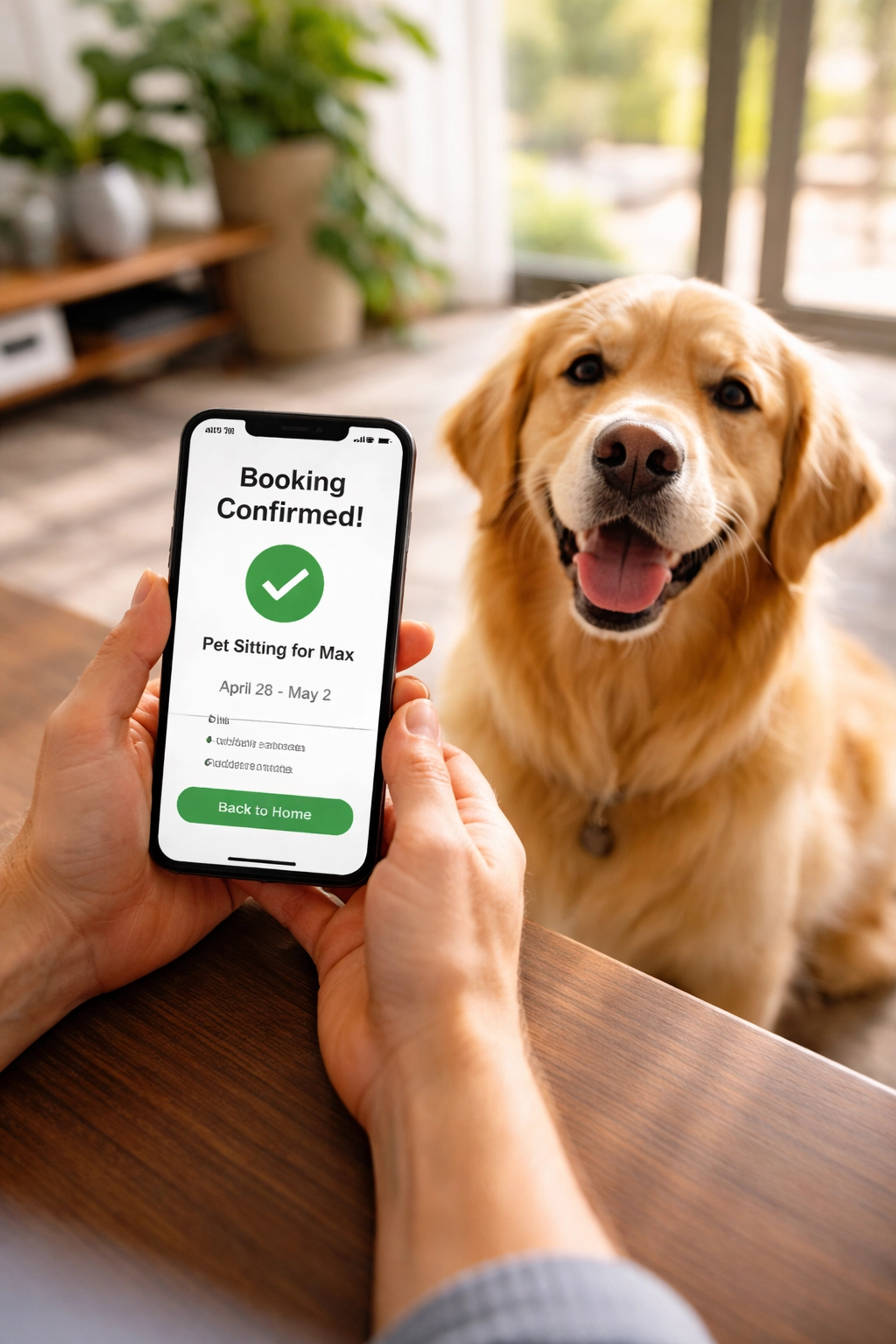
Keep Pet Owner Portals Mobile-Friendly
Here's a stat that matters: over 60% of local searches happen on mobile devices. Your clients are checking for updates on their pets while sitting in airport lounges or waiting in meetings.
If your pet owner portal isn't mobile-optimised, you're creating friction at exactly the wrong moment.
Monthly checks should include:
- Testing all portal features on various phone sizes
- Ensuring photo uploads display correctly
- Checking that update notifications work seamlessly
- Verifying login processes are smooth and quick
Update Your 'Happy Paws' Gallery
Nothing builds trust like seeing actual Brisbane pets having the time of their lives in your care. A regularly updated gallery does two powerful things:
- Shows you're active and in-demand (social proof at its finest)
- Creates local relevance when you tag locations and use Brisbane-specific captions
Aim to add fresh photos monthly: always with client permission, of course. Bonus points for including recognisable Brisbane landmarks or parks in the background.
Suburb Profiling: Owning Your Local Territory
Brisbane isn't one market: it's dozens of micro-markets, each with unique characteristics. Smart pet sitters don't try to dominate all of Brisbane. They become the undisputed leader in specific suburbs.
Here's where you should focus your energy:
Teneriffe
This inner-city gem is packed with apartment dwellers who adore their pets but often lack backyards. Dog walkers and pet sitters are in high demand here. Position yourself as the local expert who understands apartment pet care and knows every dog-friendly café along the river.
West End
Eclectic, creative, and incredibly pet-friendly: West End residents want pet sitters who match their values. Highlight your personalised care approach and any eco-friendly practices. This community responds well to authenticity.

Kangaroo Point
Another high-density area with busy professionals who travel frequently. These pet owners need reliability above all else. Showcase your consistency, communication style, and those glowing testimonials from fellow Kangaroo Point residents.
North Lakes
Moving north, North Lakes offers a different dynamic: families with larger properties and often multiple pets. Your content here should speak to managing multi-pet households and understanding the unique needs of suburban pet families.
For each target suburb, create:
- A dedicated landing page mentioning the suburb by name
- Location-specific testimonials from local clients
- Content referencing nearby parks, vets, and pet-friendly spots
- Google Business Profile posts targeting that area
Local SEO Articles That Attract Pet Parents
Content marketing isn't just for big corporations. For Brisbane pet sitters, helpful local articles are your secret weapon for attracting new clients organically.
Here are three article ideas that work brilliantly:
"The Best Dog-Friendly Parks in Brisbane's Inner North"
Pet owners are always looking for new spots to exercise their dogs. By creating a comprehensive guide to dog-friendly parks in your service area, you:
- Demonstrate local knowledge and expertise
- Attract search traffic from pet owners in those suburbs
- Position yourself as a community insider, not just a service provider
Include practical details like off-leash hours, water availability, parking tips, and any council regulations to be aware of.
"Finding a Reliable Pet Sitter for the Queensland School Holidays"
School holidays are peak season for pet sitting. Parents are planning trips, and the search for trustworthy pet care begins weeks in advance.
This article should cover:
- What to look for in a pet sitter
- Questions to ask during a meet and greet
- How far in advance to book (hint: earlier than most people think!)
- Red flags to watch out for
Naturally, you become the obvious solution by the time they finish reading.

"Staying Safe: Local Pet Care Tips for the Brisbane Summer"
Brisbane summers are no joke: heat, humidity, and storm season create real challenges for pet safety. An article addressing these concerns shows you understand local conditions and prioritise animal welfare.
Cover topics like:
- Keeping pets cool during heatwaves
- Recognising signs of heat stress
- Storm anxiety management
- Tick prevention in subtropical climates
- Safe water activities for dogs
This type of content builds trust and demonstrates your expertise in ways that a simple services page never could.
Staying Compliant: A Quick Note on Brisbane Regulations
While building your local authority, don't forget the legal side of running a pet sitting business in Brisbane. Compliance builds credibility.
Key things to keep in mind:
- If you keep more than 2 dogs, you'll need a domestic dog permit from Brisbane City Council
- Once your annual income exceeds $18,200, you must register with the ATO and obtain an ABN
- Home-based businesses have restrictions on client visits and noise levels
- Commercial animal premises may require additional licensing
Mentioning your compliance in your marketing materials (without being boring about it) reassures pet owners that you're professional and legitimate.
Consistency Is the Real Secret
Here's the truth about local authority maintenance: it's a marathon, not a sprint.
The pet sitters who dominate their local markets aren't doing anything magical. They're simply showing up consistently: updating their websites, publishing helpful content, and staying visible in their target suburbs month after month.
When you commit to this approach, something wonderful happens. You stop competing on price and start being chosen on reputation. You become the pet sitter that locals recommend to each other without hesitation.
Ready to lead the pack in your Brisbane suburb?
Building and maintaining local authority takes time, expertise, and consistency. If you'd rather focus on what you do best: caring for Brisbane's beloved pets: we can handle the rest.

Local Authority Maintenance for Brisbane Property Stylists: Creating a Picture-Perfect Search Presence
You know the feeling. You've just transformed a tired 1970s brick home in Bulimba into an absolute showstopper. The linen sofas are perfectly positioned, the natural light is hitting those rattan pendant lights just right, and the real estate agent is practically giddy.
But here's the thing, if your online presence doesn't reflect that same level of polish, you're leaving serious business on the table.
Brisbane's property market is competitive. Real estate agents have their pick of stylists, and homeowners searching for "property stylist near me" are making snap judgments based on what they see online. Your search presence needs to be as curated and intentional as the spaces you create.
That's where local authority maintenance comes in. It's the ongoing, strategic work that keeps your digital presence fresh, relevant, and impossible to ignore.
Let's break down exactly how Brisbane property stylists can create (and maintain) a picture-perfect search presence.
Why Local Authority Matters for Property Stylists
Think about how your ideal clients find you. A vendor in New Farm gets the listing. Their agent recommends three stylists. What's the first thing that vendor does?
They Google you.
And if your website looks like it hasn't been updated since 2019, or your Google Business Profile shows blurry photos from a project in Logan, you've already lost the job to a competitor with a sharper online game.
Local authority isn't just about ranking on Google (though that matters). It's about:
- Building trust before you ever pick up the phone
- Showcasing expertise in Brisbane's unique property landscape
- Dominating the suburbs where your ideal clients are selling
This isn't a set-and-forget situation. It requires consistent, monthly attention.
Monthly Website Tweaks: Keeping Your Digital Showroom Fresh
Your website is your portfolio. And just like you wouldn't show a client mood boards from five years ago, your site needs to reflect your current, best work.

Refresh Your Before & After Gallery
Nothing sells property styling quite like a jaw-dropping transformation. But here's the key, quality and recency matter.
Every month, consider:
- Adding 2-3 new high-res transformations featuring recent Brisbane projects
- Removing older images that no longer represent your aesthetic or skill level
- Including suburb tags on each project (more on this shortly)
- Writing short captions that mention property type, styling approach, and outcome ("This Queenslander in Paddington sold $85K over reserve after a full staging refresh")
Pro tip: Invest in professional photography for your hero projects. Phone photos don't cut it when you're competing with stylists who understand visual branding.
Optimise Your 'Book a Consultation' Forms
Your website might get traffic, but if your contact forms are clunky or buried, you're losing leads.
Monthly checks should include:
- Testing form functionality (you'd be surprised how often these break)
- Reducing form fields to essentials, name, email, phone, suburb, property type
- Adding urgency cues like "Book your styling consultation before auction season heats up"
- Mobile responsiveness testing (most of your traffic is on phones)
Highlight Your Team's Brisbane Expertise
Brisbane isn't Melbourne. It's not Sydney. The architecture here, from heritage Queenslanders to sleek Newstead apartments, demands specific styling knowledge.
Make sure your team profiles communicate:
- Experience with local architectural styles (Queenslanders, federation homes, modern builds)
- Understanding of Brisbane's climate (airflow, natural materials, indoor-outdoor flow)
- Connections to local suppliers and trades
This isn't just fluff. It's trust-building content that tells potential clients you get Brisbane.
Suburb Profiling: Own Your Territory
Here's where the magic happens. Generic "Brisbane property stylist" content won't cut through. You need to establish authority in the specific suburbs where high-value listings happen.

Target Premium and High-Turnover Markets
For Brisbane property stylists, the money suburbs are clear:
| Suburb | Why It Matters |
|---|---|
| Hamilton | Prestige market, high-end buyers, premium staging budgets |
| Ascot | Heritage homes, racing season appeal, affluent demographics |
| New Farm | Inner-city appeal, mix of apartments and character homes |
| Bulimba | Family market, strong turnover, renovation hotspot |
| Teneriffe | Warehouse conversions, design-savvy buyers |
| Paddington | Queenslanders galore, style-conscious sellers |
Create Suburb-Specific Content
Each of these suburbs deserves dedicated attention on your website. Consider creating:
- Suburb landing pages ("Property Styling in Hamilton – Prestige Homes Deserve Prestige Staging")
- Case studies tagged by location so agents searching for "New Farm property stylist" find your work
- Local insights that demonstrate genuine knowledge ("Hamilton buyers expect European oak flooring and neutral palettes")
This isn't just SEO strategy, it's positioning. When an Ascot agent needs a stylist, you want your name synonymous with that suburb.
Local SEO Articles: Content That Works While You Style
Blogging might feel like a luxury when you're flat out staging properties. But strategic local SEO articles are one of the most powerful tools for building search authority.
The key word here is strategic. You're not writing for the sake of it. You're creating content that answers real questions your potential clients are Googling.

Article Ideas That Actually Drive Traffic
Here are three proven content angles for Brisbane property stylists:
1. "Styling for the Brisbane Climate: Choosing Textures and Tones That Work"
This article positions you as the expert on what actually works in subtropical conditions. Cover:
- Breathable fabrics (linen, cotton, rattan)
- Colour palettes that handle Brisbane's intense natural light
- Indoor-outdoor styling for Queensland living
- Avoiding materials that warp, fade, or feel wrong in humidity
2. "5 Ways Property Styling Boosts Sale Prices in Brisbane's Inner North"
This is conversion content. It speaks directly to vendors considering styling and gives them the ROI case. Include:
- Local market statistics
- Before/after examples from inner north suburbs
- Quotes from real estate agents you've worked with
- Average price uplift data
3. "Preparing Your Home for a Brisbane Spring Auction: The Ultimate Styling Checklist"
Seasonal content with a clear call to action. Time this for August/September and cover:
- Room-by-room styling priorities
- Decluttering strategies
- Garden and outdoor staging tips
- Timeline for booking a stylist before auction day
Publishing Cadence
You don't need to blog weekly. One well-researched, suburb-aware article per month will compound over time and build serious search authority.
Consistency Is the Competitive Edge
Here's the truth most property stylists miss: your competitors aren't doing this consistently.
They might update their website once a year. They might have a blog with three posts from 2021. Their Google Business Profile might still show a warehouse project from the Southside.
That's your opportunity.
By committing to monthly local authority maintenance: fresh gallery images, optimised forms, suburb-specific content, and strategic SEO articles: you create a compounding advantage that gets stronger every single month.
And when that New Farm agent Googles "property stylist New Farm," your name comes up first. Your portfolio looks incredible. Your content demonstrates expertise.
The job is yours before you've even quoted.
Ready to Dominate Your Local Area?
Maintaining local authority takes time and consistency: two things that are hard to find when you're busy transforming Brisbane homes.
That's exactly why we built our Local Authority Maintenance service. We handle the monthly website tweaks, suburb profiling, and SEO content so you can focus on what you do best: creating stunning spaces that sell.
Dominate your local area and let your online presence be as polished as your styling.

Local Authority Maintenance for Brisbane Dentists: Brightening Your Practice's Search Presence
When a Brisbane local chips a tooth on a Saturday morning or finally decides it's time for that teeth whitening they've been putting off, where do they turn? Google. And if your dental practice isn't showing up prominently in those crucial local searches, you're losing patients to competitors down the road.
Here's the thing: ranking well in local search isn't a one-time achievement. It's an ongoing process that requires consistent attention, strategic updates, and a deep understanding of your local market. That's where local authority maintenance comes in: and for Brisbane dentists, it could be the difference between a thriving practice and an empty waiting room.
Why Local Authority Matters for Your Dental Practice
Think about your ideal patient. They're searching for "dentist near me" or "emergency dentist Brisbane" on their phone. Google's job is to show them the most relevant, trustworthy options in their area.
Local authority is essentially how much trust search engines place in your practice for specific geographic areas. The stronger your local authority, the higher you appear in:
- Google's local pack (the map results)
- Organic search results for location-based queries
- "Near me" searches on mobile devices
For dental practices, this is particularly critical because dental services are inherently local. Nobody's driving an hour for a routine check-up. Your patients live, work, and search within a tight radius of your clinic.
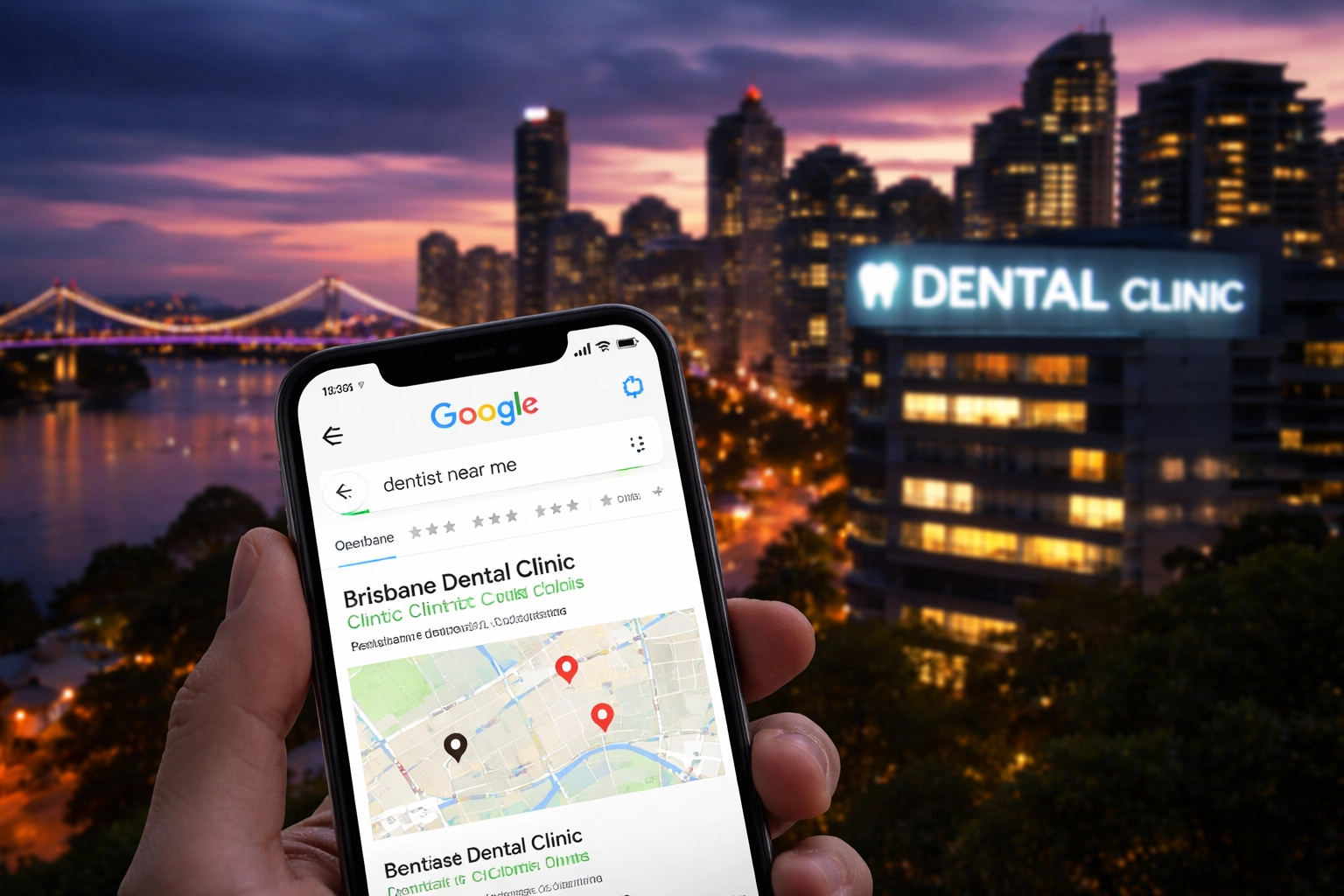
Monthly Website Tweaks: Small Changes, Big Impact
Your website isn't a "set and forget" asset. It needs regular attention to stay relevant, user-friendly, and optimised for search. Here's what your monthly maintenance checklist should include:
Streamline Your 'Book Online' Buttons
Your booking system is the conversion point of your entire online presence. If it's clunky, hidden, or frustrating, potential patients will bounce.
Monthly checks should include:
- Testing all booking buttons across desktop and mobile
- Ensuring the booking process requires minimal clicks (aim for three or fewer)
- Checking that confirmation emails are sending correctly
- Verifying appointment availability displays accurately
Pro tip: Place a prominent "Book Online" button in your header navigation so it's visible on every page without scrolling.
Update Your Smile Gallery
Before-and-after galleries are gold for dental practices. They showcase your skills, build trust, and help patients visualise their own potential transformations.
Each month, aim to:
- Add at least one new smile transformation (with patient consent, of course)
- Include a brief description of the treatment performed
- Tag images with relevant alt text like "teeth whitening results Brisbane" or "dental veneers New Farm patient"
- Remove outdated or lower-quality images that don't represent your current standards
Make Emergency Contact Information Unmissable
Dental emergencies don't wait for business hours. When someone's in pain at 10 PM, they need to find your emergency contact fast.
Ensure your emergency information is:
- Visible above the fold on your homepage
- Mobile-clickable (tap-to-call functionality)
- Consistent across your website, Google Business Profile, and social media
- Updated with current after-hours procedures

Suburb Profiling: Owning Your Local Turf
Brisbane isn't one homogenous market: it's a collection of distinct suburbs, each with its own demographics, needs, and search behaviours. Smart dental practices build authority in specific suburbs rather than trying to rank for all of Brisbane at once.
Target Family-Oriented and Affluent Suburbs
For Brisbane dentists, some of the most valuable suburbs to establish authority in include:
| Suburb | Why It Matters |
|---|---|
| Bulimba | Young families, high disposable income, values quality healthcare |
| New Farm | Professionals seeking cosmetic and premium dental services |
| Paddington | Established families, strong community ties, word-of-mouth potential |
| Coorparoo | Growing families, mix of long-term residents and newcomers |
Create Dedicated Suburb Pages
Each target suburb deserves its own page on your website. These pages should include:
- Location-specific headlines (e.g., "Your Trusted Family Dentist in Bulimba")
- Local landmarks and references that resonate with residents
- Directions from the suburb to your clinic
- Testimonials from patients in that area (where possible)
- Unique content: not just the same page with the suburb name swapped out
Important: Google is smart enough to recognise duplicate content with location names switched. Each suburb page needs genuinely unique, valuable content to rank effectively.
Build Local Citations
Consistency is everything when it comes to local citations. Your practice name, address, and phone number (NAP) should appear identically across:
- Google Business Profile
- Healthdirect Australia
- Local business directories
- Industry-specific directories like the ADA Find-a-Dentist
- Social media profiles
Even small inconsistencies: like "Street" vs "St" or missing suite numbers: can dilute your local authority.

Local SEO Articles: Content That Captures Brisbane Searches
Beyond your service pages, strategic blog content helps you capture searches that potential patients are actively making. Here are three content pillars every Brisbane dental practice should develop:
1. Emergency Dental Content
Target topic: "What to do in a Brisbane dental emergency"
This content serves patients in crisis mode: and positions your practice as the solution. Cover:
- Common dental emergencies (knocked-out teeth, severe toothache, broken crowns)
- Immediate first-aid steps patients can take
- When to seek emergency care vs. waiting for a regular appointment
- Your practice's emergency contact procedures and after-hours availability
Pro tip: Include a prominent call-to-action with your emergency phone number directly in this content.
2. Family-Friendly Dentist Guides
Target topic: "Finding the best family-friendly dentist in Brisbane's inner suburbs"
Parents searching for a family dentist have specific concerns: Are you good with kids? Do you offer early morning or Saturday appointments? Is your clinic welcoming and non-intimidating?
Your content should address:
- What makes a dental practice "family-friendly"
- Questions parents should ask when choosing a dentist
- How your practice caters to children and anxious patients
- The importance of establishing dental care early
3. Cosmetic Dentistry Guides
Target topic: "A guide to modern teeth whitening options in South East Queensland"
Cosmetic dentistry searches often come from patients ready to invest in their smile. Capture this intent with comprehensive guides covering:
- In-chair vs. take-home whitening options
- Expected results and longevity
- Cost considerations and value comparisons
- Why professional whitening outperforms over-the-counter products
This positions your practice as the knowledgeable, trustworthy choice when they're ready to book.
Tracking and Optimising Your Progress
Local authority maintenance isn't guesswork: it's data-driven. Monitor these key metrics monthly:
- Local keyword rankings for your target suburbs and services
- Google Business Profile insights (searches, views, actions)
- Website traffic from local organic searches
- Conversion rates on booking pages
- Review volume and sentiment across platforms
When you notice rankings slipping or competitors gaining ground, you can adjust your strategy before losing significant ground.
Ready to Brighten Your Practice's Search Presence?
Building and maintaining local authority takes consistent effort, strategic thinking, and a deep understanding of Brisbane's local search landscape. But the payoff: a steady stream of local patients finding and choosing your practice: is worth every bit of that investment.
Your potential patients are searching right now. The question is: are they finding you, or your competitors?
Dominate your local area with a local authority maintenance strategy built specifically for Brisbane dental practices. Let's make sure the next "dentist near me" search puts your practice front and centre.

Local Authority Maintenance for Brisbane Conveyancers: Closing More Leads, One Suburb at a Time
Here's a number that should get your attention: Brisbane processed over 90,000 property transfers last financial year. That's 90,000 potential clients searching online for a conveyancer they can trust with one of the biggest financial decisions of their lives.
The question is: are they finding you?
For Brisbane conveyancers, the competition isn't just about expertise in PEXA settlements or knowing the ins and outs of Queensland's property laws. It's about showing up first when a first-home buyer in Chermside or a downsizing couple in Indooroopilly types "conveyancer near me" into Google.
That's where Local Authority Maintenance comes in. It's not a one-and-done SEO project. It's an ongoing strategy that positions your conveyancing practice as the go-to expert in your target suburbs: month after month, search after search.
Let's break down exactly how it works.
What Is Local Authority Maintenance (And Why Should You Care)?
Think of Local Authority Maintenance as your digital reputation manager. It's the consistent, strategic work that keeps your website fresh, your local presence strong, and your content relevant to the suburbs you serve.
For conveyancers, this matters because:
- Property buyers research locally – They want someone who understands their specific area, council requirements, and local market nuances
- Google rewards consistency – Regular updates and location-specific content signal to search engines that your site is active and authoritative
- Trust is everything – In a profession built on handling sensitive documents and significant transactions, appearing polished and professional online isn't optional
The goal? When someone in North Lakes needs a conveyancer, your name should be the first they see: and the one they trust.

Monthly Website Tweaks: Small Changes, Big Impact
Your website isn't a "set and forget" asset. For conveyancers especially, small friction points can send potential clients straight to your competitors. Here's what regular maintenance should look like:
Streamlining Your 'Instant Quote' Calculator
Let's be honest: price is the first thing most people want to know. An instant quote calculator is a powerful lead generation tool, but only if it works flawlessly.
Monthly checks should include:
- Speed testing – Does it load in under 3 seconds on mobile?
- Accuracy updates – Are your disbursement estimates current with Queensland Land Registry and search fees?
- User experience review – Is the form intuitive? Are error messages helpful?
- Conversion tracking – How many people start the calculator vs. complete it?
Pro tip: Add a simple follow-up email sequence for anyone who uses your calculator but doesn't convert. A gentle nudge with helpful information can bring them back.
Securing Your Contract Upload Portals
Your clients need to upload sensitive documents: contracts of sale, identification, financial statements. If your portal looks even slightly dodgy, they'll hesitate.
Regular maintenance means:
- SSL certificate checks – That padlock icon matters
- Mobile responsiveness testing – Most people will upload from their phones
- Clear instructions – Tell them exactly what to upload and in what format
- Security compliance updates – Stay current with Australian privacy requirements
Clarifying Fee Structures
Nothing frustrates a potential client more than hidden costs. Your website should clearly distinguish between:
| Fee Type | What It Includes |
|---|---|
| Fixed professional fee | Your conveyancing service from start to settlement |
| Disbursements | Title searches, council searches, registration fees |
| Out-of-pocket costs | Bank fees, body corporate certificates, special searches |
Update these quarterly as government fees change. Transparency builds trust: and trust closes deals.

Suburb Profiling: Own Your Territory
Here's where Local Authority Maintenance really shines for Brisbane conveyancers. Instead of trying to rank for "conveyancer Brisbane" against every competitor in the city, you target the suburbs where your ideal clients actually live.
High-Growth Real Estate Corridors to Target
Brisbane's property market isn't uniform. Some areas are booming with new developments, first-home buyers, and investment activity. These are your goldmines:
Chermside
- Major shopping and hospital precinct attracting young professionals
- High apartment density means lots of off-the-plan purchases
- Content angle: "What Chermside buyers need to know about body corporate searches"
Upper Mount Gravatt
- Family-friendly suburb with strong resale activity
- Close to universities: investor appeal
- Content angle: "Conveyancing for investment properties in Upper Mount Gravatt"
Indooroopilly
- Established suburb with renovation and knockdown-rebuild activity
- Higher price points mean clients value expertise over bargain fees
- Content angle: "Heritage overlays and what they mean for Indooroopilly property buyers"
North Lakes
- One of Brisbane's fastest-growing suburbs
- New estates, first-home buyers, and growing families
- Content angle: "Your complete guide to buying in North Lakes' new developments"
How to Build Suburb Authority
Creating a dedicated suburb page isn't enough. You need to maintain and expand that content over time:
- Add recent settlement examples (anonymised) from each area
- Reference local landmarks and amenities – Shows you actually know the suburb
- Update market insights quarterly – "North Lakes saw a 12% increase in settlements this quarter"
- Include council-specific information – Brisbane City Council vs. Moreton Bay Regional Council requirements differ

Local SEO Articles: Content That Actually Converts
Generic blog posts about "what is conveyancing" won't move the needle. Your content needs to answer the specific questions Brisbane property buyers are actually asking.
Here are three article frameworks that work:
1. A Checklist for Buying Property in Brisbane's Northern Suburbs
This is high-intent content. Someone searching for this is actively in the buying process.
Cover topics like:
- Council search requirements for Moreton Bay Regional Council properties
- Flood zone considerations in low-lying areas
- New estate covenants and their implications
- Timeline expectations for settlements in high-demand areas
Pro tip: Create a downloadable PDF checklist. It's a lead magnet that provides genuine value.
2. Navigating Queensland's PEXA Process for Digital Settlements
PEXA has transformed conveyancing, but many buyers (and even some agents) don't understand it. Position yourself as the expert:
- Explain what PEXA is in plain English
- Outline the benefits for buyers and sellers
- Address common concerns about digital settlements
- Highlight what your firm does to ensure smooth electronic transfers
This content builds confidence. A client who understands the process is a client who trusts their conveyancer.
3. How to Avoid Contract Pitfalls in the QLD Property Market
Queensland property contracts have unique elements: sunset clauses, special conditions, finance clauses. Create content that:
- Highlights the top 5 contract mistakes Brisbane buyers make
- Explains cooling-off periods and their exceptions
- Covers the risks of unconditional contracts at auction
- Positions your review service as essential protection
This is where you demonstrate expertise that justifies your fees.
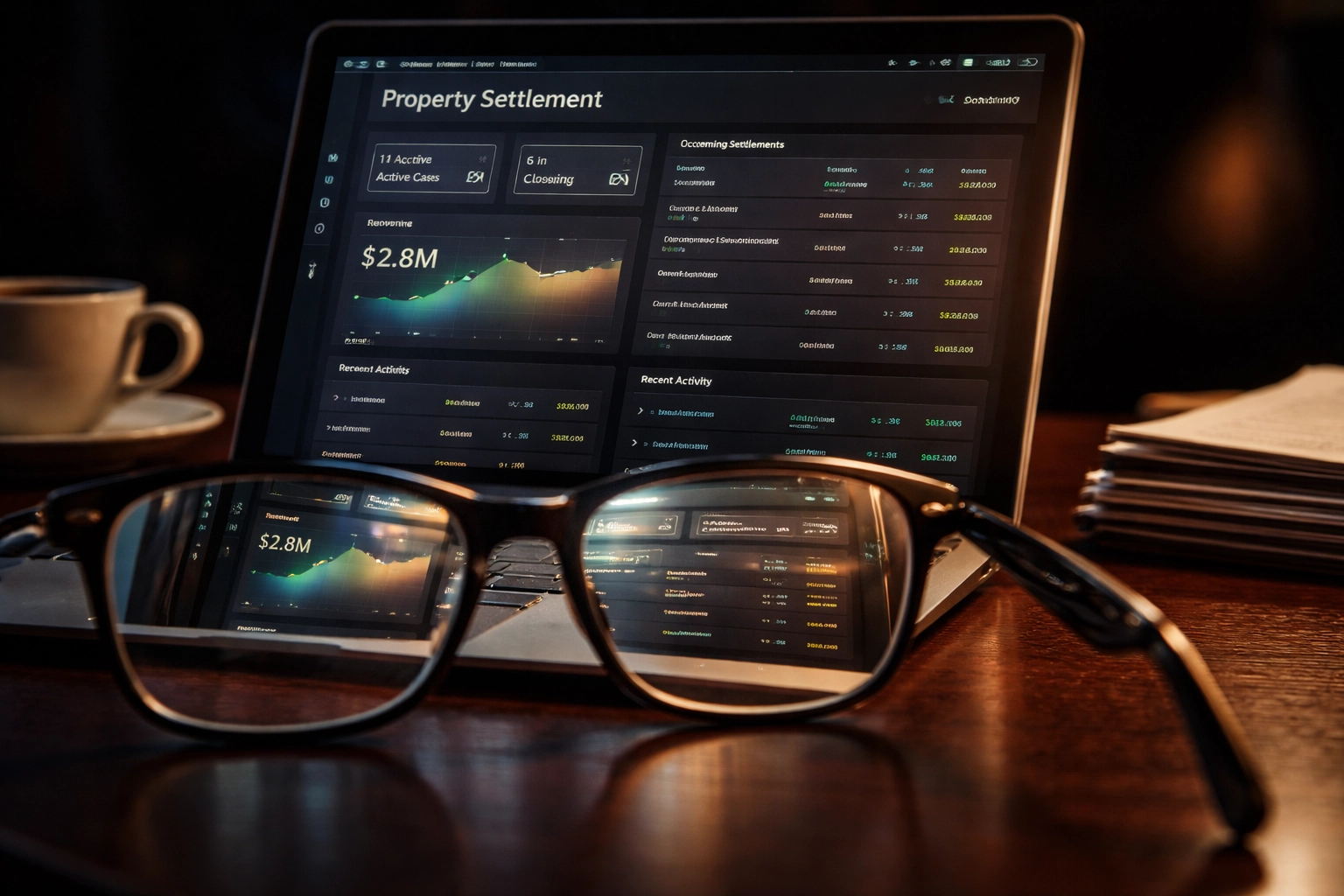
Putting It All Together: Your Monthly Maintenance Checklist
Local Authority Maintenance isn't complicated, but it does require consistency. Here's a simple monthly framework:
Week 1: Website Health Check
- Test quote calculator functionality
- Review upload portal security
- Update any changed fee structures
Week 2: Suburb Content Refresh
- Add new insights to one suburb page
- Update local market data if available
- Check local backlink opportunities
Week 3: New SEO Content
- Publish one locally-focused article
- Optimise for target suburb keywords
- Share across social channels
Week 4: Performance Review
- Check Google Business Profile insights
- Review which pages are driving enquiries
- Plan next month's focus areas
Ready to Dominate Your Local Area?
Brisbane's property market isn't slowing down. Every day, buyers and sellers in Chermside, Upper Mount Gravatt, Indooroopilly, and North Lakes are searching for a conveyancer they can trust.
The firms that show up: consistently, professionally, and locally: are the ones closing deals. The rest? They're wondering why their phone isn't ringing.
Local Authority Maintenance isn't about tricks or shortcuts. It's about doing the work that builds genuine online authority in the suburbs where your clients live.
Dominate your local area – Let's make your conveyancing practice the first name Brisbane buyers find.

Local Authority Maintenance for Brisbane Architects: Designing a Blueprint for Search Success
Every great architectural project begins with a solid foundation. Your online presence is no different.
In a city where design-conscious homeowners are actively searching for the perfect architect to transform their vision into reality, visibility isn't optional: it's essential. Brisbane's architectural landscape is competitive, and the firms that consistently appear at the top of local search results aren't just lucky. They're intentional.
Welcome to Local Authority Maintenance: a strategic, ongoing approach to building your digital presence with the same precision you bring to your design work. Think of it as the maintenance plan for your online reputation, ensuring your practice stays front and centre when Brisbane residents search for architectural expertise.
Why Local Authority Maintenance Matters for Brisbane Architects
Consider this: when a homeowner in Ascot decides to finally renovate their sprawling Queenslander, where do they start? Google. When a young professional in Teneriffe wants to explore options for a warehouse conversion, they're not flipping through the Yellow Pages: they're scrolling through search results.
Local Authority Maintenance ensures your firm appears prominently in these crucial moments. It's not a one-time SEO fix. It's a continuous commitment to:
- Keeping your website fresh, relevant, and optimised
- Establishing your expertise in key Brisbane suburbs
- Creating valuable content that positions you as the go-to authority
Just like a building requires regular maintenance to remain functional and beautiful, your online presence demands consistent attention to stay competitive.

Monthly Website Tweaks: The Details That Drive Enquiries
Your website is your digital showroom. It's where potential clients form their first impression of your practice: and first impressions in architecture are everything.
Keep Your Project Portfolio Current
Nothing says "thriving practice" quite like a portfolio brimming with recent, stunning work. Here's how to maintain yours:
- Upload high-resolution imagery of completed projects monthly: showcase those dramatic angles and thoughtful details
- Include project narratives that explain your design philosophy and problem-solving approach
- Categorise by project type: residential, commercial, heritage renovations, new builds
- Add location tags to each project for local SEO benefits
Pro tip: Feature at least one Brisbane-based project prominently on your homepage. Local clients want to see that you understand the nuances of designing for this city.
Optimise Your Inquiry Forms
Your inquiry form is the bridge between a curious visitor and a paying client. Make it inviting, not intimidating:
- Keep fields minimal: name, email, phone, and a brief project description
- Add a dropdown menu for project types (new build, renovation, extension, commercial)
- Include a budget range selector to pre-qualify leads
- Ensure mobile responsiveness: many enquiries come from smartphones
Elevate Your 'Meet the Team' Pages
Architecture is personal. Clients aren't just hiring a firm; they're entrusting their vision to individuals. Your team pages should reflect this:
- Professional headshots with consistent styling
- Credentials and registrations (BOAQ, AIA membership)
- Design philosophy statements that reveal personality
- Notable projects each team member has contributed to
Remember, clients in Brisbane's high-end suburbs are looking for architects they can trust and relate to. Let your team's expertise and passion shine through.
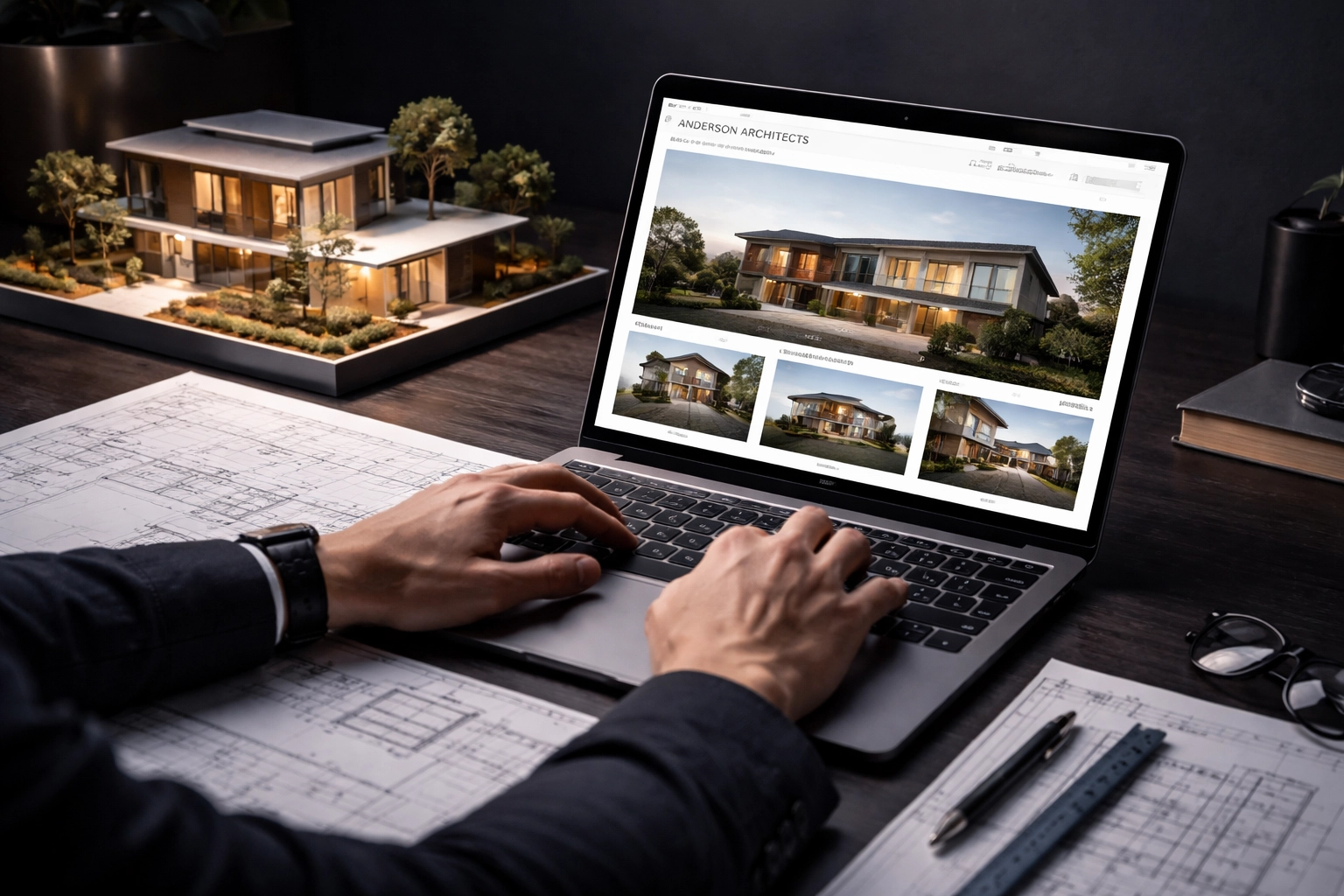
Suburb Profiling: Establishing Authority Where It Counts
Brisbane isn't one homogenous market. It's a tapestry of distinct suburbs, each with unique architectural character, council requirements, and client expectations. Suburb profiling means strategically positioning your firm as the expert in specific, high-value areas.
Target Suburbs for Brisbane Architects
Focus your attention on suburbs with high renovation activity and discerning clientele:
| Suburb | Why Target It |
|---|---|
| Ascot | Prestige market, heritage homes, high-budget renovations |
| Hamilton | Waterfront properties, luxury new builds, affluent demographics |
| Teneriffe | Warehouse conversions, contemporary design enthusiasts |
| Graceville | Family-oriented renovations, character homes, established streets |
| New Farm | Inner-city density, heritage overlays, design-savvy clients |
| Bulimba | Growing families, Queenslander restorations, premium budgets |
How to Build Suburb Authority
Creating dedicated suburb pages on your website signals to Google: and potential clients: that you genuinely understand these areas:
- Write 500+ word suburb guides covering local architectural styles, council considerations, and design opportunities
- Showcase relevant projects completed in each suburb
- Include testimonials from clients in those areas
- Reference local landmarks and neighbourhood character
When someone in Hamilton searches "architect Hamilton Brisbane," you want your firm appearing with content that speaks directly to their needs.

Local SEO Articles: Content That Converts
Beyond suburb pages, regularly publishing locally-focused blog content dramatically boosts your search visibility. These articles demonstrate expertise while capturing valuable search traffic.
Article Ideas for Brisbane Architects
1. Subtropical Design Tips for Brisbane Homes
Brisbane's climate demands thoughtful design. Write about:
- Maximising cross-ventilation and natural airflow
- Selecting materials that withstand humidity and UV exposure
- Integrating outdoor living spaces seamlessly
- Passive cooling strategies that reduce energy costs
2. Navigating Brisbane City Council Planning Approvals
Position yourself as the guide through bureaucratic complexity:
- Overview of the Brisbane City Plan 2014 and its implications
- When you need development approval vs. accepted development
- How to work with heritage overlays and character housing provisions
- Timeline expectations and common pitfalls to avoid
Pro tip: Reference that BCC requires on-maintenance inspections for council-owned assets and condition assessments at least every three years. This demonstrates your knowledge of regulatory frameworks.
3. The Ultimate Guide to Renovating Heritage Queenslanders
Brisbane's inner north is brimming with character homes begging for sensitive renovation:
- Understanding Traditional Building Character overlays
- Balancing heritage preservation with modern functionality
- Strategies for extending Queenslanders without compromising character
- Working with heritage consultants and council requirements

The Compound Effect: Why Consistency Wins
Local Authority Maintenance isn't about dramatic, overnight transformations. It's about steady, strategic improvements that compound over time.
Consider the impact of twelve months of consistent effort:
- 12 new portfolio projects showcasing recent work
- 6 suburb authority pages targeting high-value areas
- 12 locally-focused blog articles capturing search traffic
- Countless small optimisations improving user experience
After a year, your website becomes an authoritative resource that Google rewards with higher rankings: and clients reward with enquiries.
Your Blueprint for Search Success
Brisbane architects face a unique opportunity. The city is growing, homeowners are investing in quality design, and the demand for skilled architects has never been higher. But opportunity without visibility is wasted potential.
Local Authority Maintenance provides the framework to:
- Stay visible in an increasingly competitive digital landscape
- Build trust with prospective clients before they even contact you
- Establish authority in the suburbs and project types that matter most to your practice
Your designs shape Brisbane's built environment. Isn't it time your online presence reflected that same level of intention and excellence?
Dominate Your Local Area
Ready to build an online presence as impressive as your architectural portfolio? Local Authority Maintenance gives Brisbane architects the strategic edge to attract high-quality clients consistently.
